For Ever Mozart Blu-ray Movie
HomeFor Ever Mozart Blu-ray Movie 
Cohen Media Group | 1996 | 85 min | Not rated | Jan 07, 2014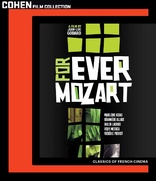
Movie rating
6.4 | / 10 |
Blu-ray rating
| Users | 0.0 | |
| Reviewer | 3.5 | |
| Overall | 3.5 |
Overview
For Ever Mozart (1996)
Jean-Luc Godard's densely packed rumination on the need to create order and beauty in a world ruled by chaos is divided into four distinct but tangentially related stories, including the attempts by a young group of idealists to stage a play in war-torn Sarajevo and an elderly director's efforts to complete his film.
Starring: Frédéric Pierrot, Madeleine Assas (I), Ghalia Lacroix, Bérangère Allaux, Vicky MessicaDirector: Jean-Luc Godard
| Foreign | Uncertain |
| Drama | Uncertain |
| War | Uncertain |
| Comedy | Uncertain |
Specifications
Video
Video codec: MPEG-4 AVC
Video resolution: 1080p
Aspect ratio: 1.33:1
Original aspect ratio: 1.37:1
Audio
French: LPCM 2.0
Subtitles
English
Discs
50GB Blu-ray Disc
Single disc (1 BD)
Playback
Region free
Review
Rating summary
| Movie | 3.0 | |
| Video | 4.5 | |
| Audio | 4.0 | |
| Extras | 3.5 | |
| Overall | 3.5 |
For Ever Mozart Blu-ray Movie Review
I Dream of Wolfgang?
Reviewed by Jeffrey Kauffman January 17, 2014Is this some kind of joke? Or perhaps more accurately, several kinds of jokes? For Ever Mozart’s title famously puns in French (faut rêver Mozart). But perhaps more saliently, this is a film where master provocateur Jean-Luc Godard, a filmmaker who has spent much of his career intentionally upsetting the cinematic apple cart through disjunctive editing, nonlinear storytelling and bizarre sound designs, attempts to craft a film which is ostensibly about creating order out of chaos. Furthermore, Godard does this with a conceit that seems at least tangentially (and perhaps unintentionally) related to another master filmmaker, Ingmar Bergman, in at least one of that artist’s most singular visions, The Magician and perhaps even with regard to The Seventh Seal. Godard has obviously long been concerned with structure and certain “meta” issues which ironically inform his work on a sometimes subliminal level, but in the auteur’s rather singular filmography For Ever Mozart is certainly one of his stranger beasts, a film that often seems like the cinematic version of a jigsaw puzzle where the pieces have been scattered across the floor and the viewer is left to infer what exactly the completed picture is supposed to be. One of the oddest things about For Ever Mozart is its setting (or at least its putative setting), the Bosnian conflict of the 1990s which, as devastating as it evidently was, never really rose to the levels of public consciousness that other major conflicts of the 20th century did. The film was evidently inspired by a kind of snarky French article Godard read about an “unnamed woman” (whom commentator James Quandt identifies as Susan Sontag—Susan Sontag!) who attempted to bring supposed joy and light to the beleaguered Bosnians by putting on a production of Samuel Beckett’s Waiting for Godot. Now that may strike many readers as patently odd, for the Beckett play is (unfairly in my opinion) often pilloried for being nearly as obtuse as any given Godard film, but the fact is the play is absolutely hilarious when seen in live performance (rather than simply read, which seems to be the default way many contemporary people experience it). One way or the other, the article suggested a more appropriate playwright might have been the 18th century French author Pierre de Marivaux. For some reason, that idea intrigued Godard, and he used that basic (if rather flimsy) foundation to support a quadrilateral collage of typically heady philosophizing and critique.
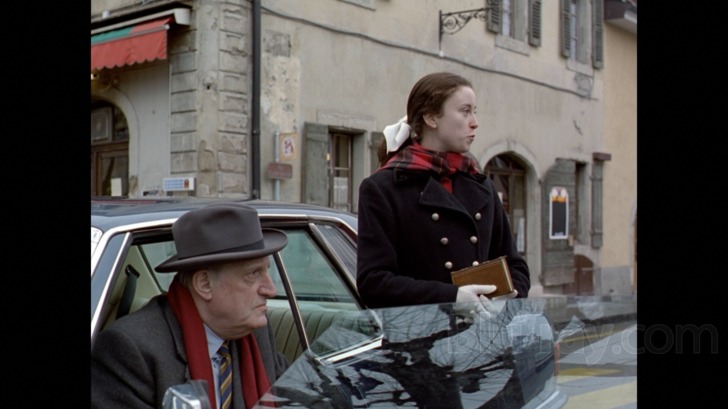
Listening to Quandt’s commentary is in a way like suddenly being offered a footnote filled reference volume of a previously impenetrable text, for it simply can’t be denied that For Ever Mozart seems on its surface to be a rather haphazard combination of storylines and ideas. The basic setup finds Camille (Madeleine Assas) standing in for Sontag, only in this iteration she ends up wanting to produce a play by a 19th century French playwright, Alfred de Musset. A band of amateur performers is recruited to travel to the war torn countryside of Sarajevo (evidently actually Switzerland, but who’s counting?), where Godard indulges in a contrast between “not ready for prime time” performers and equally unsteady on their feet warriors. Who’s to say which piece of “theater” is the more objectionable? It’s a rather piquant conceit, but in Godard’s formulation, it’s often so opaque as to be incomprehensible.
This opening sequence finds Camille and her cohorts (including her filmmaker father, played by Vicky Messica, in a role that is clearly meant as a stand-in for Godard himself) basically reciting various philosophical points as they decide to put on their play in strife weary Sarajevo. This first section is almost deliberately static, which only makes the next part of the film—when Camille and some of her fellow performers—become prisoners of war. Godard is typically discursive here, implying violence while never really totally indulging in the audience’s perhaps voyeuristic desire to see what’s going on. The third part of the film ventures back to the story of Camille’s father, who had had the good sense to get the hell out of Dodge (and/or Sarajevo) before the atrocities began, and who is now working on a lamentable piece of cinematic garbage rather hilariously entitled The Fatal Bolero. What is the connection to what has gone before? As always, Godard holds his cards close to his vest, though there’s an underlying tension from the audience’s standpoint, knowing what’s been happening to Camille while her father is off creating what amounts to filmic blather. And then finally Godard disrupts the proceedings again to offer us a bit of—Mozart.
While I’m always loathe to posit an “ultimate meaning” in any of Godard’s films (who would be so foolish?), I’m tempted to say that For Ever Mozart presages Stephen Sondheim’s famous song “Putting it Together” by making a case that “Art isn’t easy”. This seems to be through line here, even if unintentionally, from the faltering attempts to stage a comedy during wartime to a filming a frankly less than stellar entertainment to an allusion to one of the most iconic artists of all time who had his own share of trials and tribulations to deal with. But I wouldn’t argue too vociferously for this perspective, especially after listening to Quandt’s amazing commentary, where things as picayune as what magazine a character is holding often assume unexpected importance.
Finally, some may be wondering about my reference to the two Bergman films above. Frankly, both of these films just kind of wandered into my consciousness as I watched For Ever Mozart this time, in one of those subliminal connections that Godard films seem to effortlessly foster. The Magician is the easier referent, for it, like For Ever Mozart, offers a troupe of performers attempting to stage a show under trying circumstances, while also dealing with philosophical matters like reality versus illusion. The Seventh Seal might seem like an odd film to mention in the same breath as For Ever Mozart, especially when Bergman’s film, as evocative and symbolic as it is, is a model of narrative cohesion. But here, too, both films offer a gaggle of survivors (for a while, anyway) who dance through various traumas, never ignorant of Death, but choosing to turn their attentions elsewhere for as long as possible.
For Ever Mozart Blu-ray Movie, Video Quality 
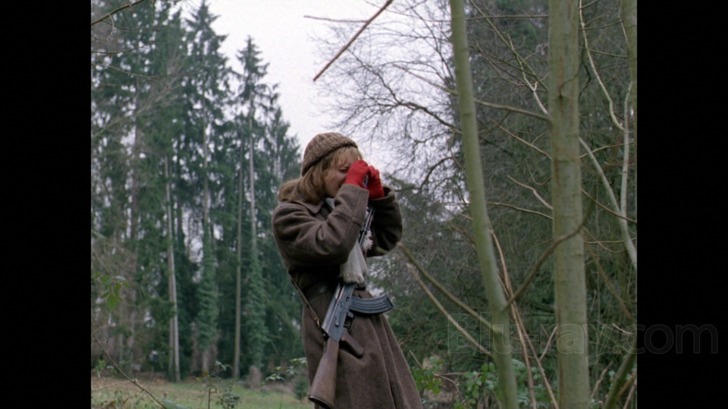
For Ever Mozart is presented on Blu-ray courtesy of Cohen Film Collection with an AVC encoded 1080p transfer in 1.33:1. As with Cohen's simultaneous release of Hail Mary, this high definition is a lustrous presentation of the film—with one important caveat (not transfer related). Unlike the summery Hail Mary, For Ever Mozart is often pretty wintry in ambience, with slate gray skies, snow, and trees barren of any leaves. That tends to make the color palette here relatively monochromatic, though bursts of hue still penetrate individual scenes. The somewhat pallid appearance of the film (which, again, is accurate to the source) is more than offset by the general excellence in both clarity and depth of the image. Contrast is also very strong throughout this presentation. As with Hail Mary, the image does not appear to have been digitally manipulated in any meaningful way, and the result is a beautifully organic and natural viewing experience.
For Ever Mozart Blu-ray Movie, Audio Quality 
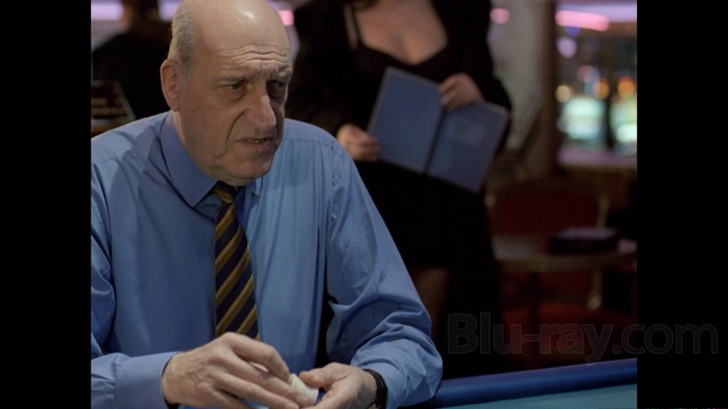
For Ever Mozart's sound design is typically Godardian, and the LPCM 2.0 track here (in the original French) presents it cleanly and clearly. As with many films in Godard's oeuvre, the director seems to delight in abrupt changes in the soundscape, and the rendering here is flawless, with excellent fidelity and surprising dynamic range. With all of this said, aside from some brief bursts of gunfire and similar effects, the film is awfully talky, without much in the way of a sonic "wow" factor.
For Ever Mozart Blu-ray Movie, Special Features and Extras 
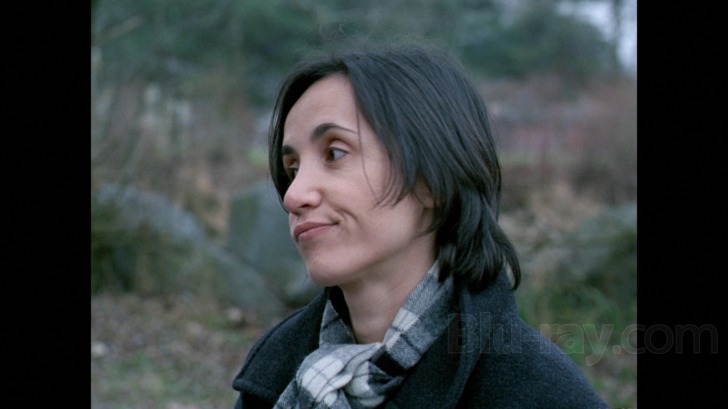
- Feature Length Audio Commentary by Senior Programmer for TIFF Cinematheque and Film Critic James Quandt. This is an exceptionally informative commentary, despite Quandt's early complaint that his "sad task" is to try to illuminate this obdurate film. Quandt provides incredible detail on a wealth of minutiae, as well as giving a good sense of Godard at this stage in the filmmaker's career. Absolutely not to be missed for Godard fans in particular, but cineastes in general.
- JLG/JCS: A Conversation with Jean-Claude Sussfeld (1080p; 23:01). Sussfeld worked with Godard on La Chinoise, so this is more of a generalist overview of working with the icon than something specifically geared toward For Ever Mozart. That said, this is often quite amusing, with Sussfeld imparting a couple of rather funny anecdotes.
- JLG/FM: A Conversation with François Musy, 2010 (1080p; 15:30). This is a really interesting piece dealing with Godard's often rather complex sound designs for his films.
- JLG/WK: A Conversation with Willy Kurant, 2010 (1080p; 19:48). Kurant replaced longtime Godard cinematographer Raoul Coutard for Godard's Masculin Feminin when Coutard wasn't available (according to Kurant), and talks here about how difficult it was to come into Godard's c inematic "family".
- JLG/ADB: A Conversation with Antoine de Baecque, 2010 (1080p; 10:45). De Baecque wrote a biography of Godard, and provides a bit of interesting information about the For Ever Mozart shoot.
- 2013 Re-Release Trailer (1080p; 1:42)
For Ever Mozart Blu-ray Movie, Overall Score and Recommendation 
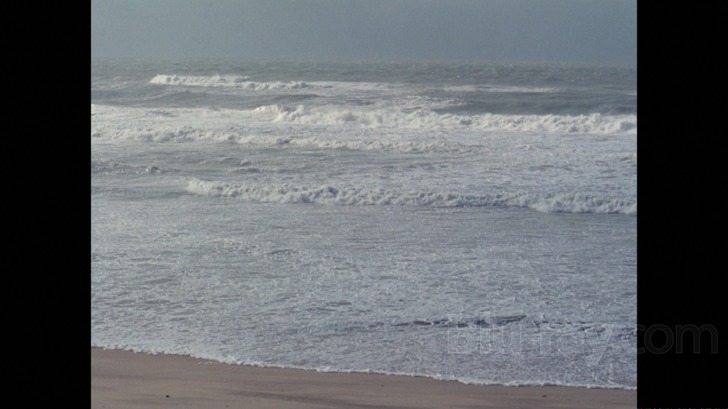
Jean-Luc Godard is a filmmaker who is incredibly easy to admire, but who is often hard to actually love. That's probably the case once again with For Ever Mozart. While some aspects of this film are relatively straightforward (at least in the arcane world of Godard), there's the typical Godardian obfuscation at hand in virtually every segment of the film. As mentioned above, "Art isn't easy", and evidently Godard isn't about to help make it any easier for his audience. This is a film that virtually requires repeated viewings, and the good news here is the Cohen's package offers excellent technical merits and some really good supplemental features. Recommended.
Similar titles
Similar titles you might also like

I Am Cuba
Soy Cuba
1964

Le Petit Soldat
The Little Soldier
1963

Cemetery of Splendor
2015

Goodbye to Language 3D
Adieu au langage
2014

The Image Book
Le livre d'image
2018

Underground
Подземље / Podzemlje
1995

Zama
2017

La Grande Illusion
Grand Illusion
1937

2 or 3 Things I Know About Her
2 ou 3 choses que je sais d'elle
1967

Shame
Skammen
1968

Ivan's Childhood
Ива́ново де́тство / Ivanovo detstvo
1962

Come and See
Иди и смотри / Idi i smotri
1985

Diamonds of the Night
Démanty noci
1964

The Burmese Harp 4K
ビルマの竪琴 / Biruma no tategoto
1956

The Great Dictator
1940

The Bridge
Die Brücke
1959

Kagemusha
影武者
1980

Baarìa
2009

Lebanon
2009

The Painted Bird
Nabarvené ptáce / Slipcover in Original Pressing
2019